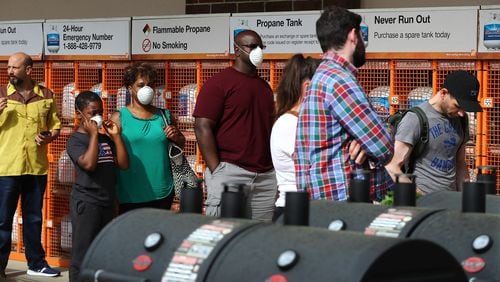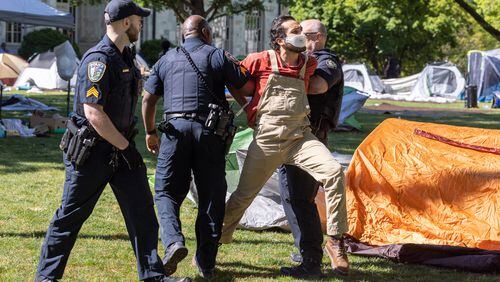We do not have a vaccine to defeat the coronavirus. In lieu of that, we have apparently decided the best strategy is to confuse it to death.
On Lake Oconee in east Georgia, weekend boaters partied like they'd never heard of COVID-19. But to the north and west, tourist-dependent Fannin County declared tourism too hazardous to permit. From its emergency declaration:
"Any customer currently occupying (currently physically present) a Tourism Rental under a paid reservation tendered prior to March 25, 2020 shall be allowed to complete the original reservation period but shall not be allowed to extend."
The inconsistency extends to the state Capitol. Less than a week ago, Gov. Brian Kemp said he wasn't worried that local communities were implementing tougher anti-pandemic restrictions than he had instituted statewide:
Kemp said he welcomed the tougher restrictions from local governments and singled out Atlanta Mayor Keisha Lance Bottoms, saying that he spoke several times with her before she implemented a shelter-in-place order across Georgia's largest city.
And he said he was not worried about a patchwork of responses that have left some areas under voluntary curfews and others with scaled-back restrictions in place. He said new restrictions on the Georgians considered most at risk of infection, as well as his other mandates, would cover local governments that have taken fewer steps.
But over the weekend, Tim Fleming, Kemp's chief of staff, criticized local governments of "overreach" for taking more stringent steps to curb coronavirus. On Sunday, a member of the governor's staff said a noted epidemiologist was at the root of his complaint.
Kemp spokeswoman Candice Broce said Fleming was venting in part because he has fielded calls from mayors and county commissioners about how "confusing these local orders have become."
And she said several calls stemmed from "some problems" with advice from Dr. Carlos del Rio, an Emory University epidemiologist who delivered a presentation to the Georgia Municipal Association last week urging cities to declare public health emergencies. Said Broce:
"[Fleming has] been getting calls from local officials across the state raising concerns about how confusing these local orders have become, all stemming from the push by county and city associations to follow del Rio's advice. Now, we are seeing some problems with del Rio's models."
"We want any medical provider, public health official or emergency management official who encourages leaders to take specific action to do so with the most up-to-date facts. We have concerns that didn't happen here."
Broce sent us a piece from The Federalist that reported del Rio used data from COVID Act Now, a group of analysts and scientists, in a presentation. The March 25 piece contended that the data has led officials to enact "ill-advised lockdowns." A taste:
In Georgia, COVID Act Now predicted 688 hospitalizations by March 23. By that date, they had around 800 confirmed cases in the whole state, and fewer than 300 hospitalized.
We appear to have caught up. As of 7 p.m. Sunday, the death toll in Georgia stood at 83, with the number of confirmed coronavirus cases increased to 2,683. And 687 remain hospitalized. In a statement late Sunday, del Rio said he's confident in his projections.
We are continuing to work closely with state officials and particularly the governor. As part of that, we are providing the latest data around the COVID pandemic and its projected impact on the state to allow them to make informed decisions to ensure that the people of Georgia remain safe.
Approaches to modeling can differ, but I will tell you that I remain confident in my data outputs. I can only provide my best thinking based on my over 30 years working in this field, it is up to the people that are making decisions to decide how best to leverage its use.
He followed up with a Tweet late Sunday:
[N]ever in my life I have wished so ardently that I am wrong. When confronting a pandemic one has to prepare for the worst and hope for the best. I pray to God that I am wrong and that the citizens of Georgia are spared from this virus. Nothing would make me happier.
***
It is worth noting that Dr. Carlos del Rio and Gov. Brian Kemp have a bit of history. After she lost the 2018 gubernatorial race, Democrat Stacey Abrams founded the group Fair Fight Action, which filed a federal lawsuit challenging Georgia's voting laws. Del Rio is among those mentioned in the legal action. From Vox.com:
Fair Fight's lawsuit cites individual stories from Georgia voters to illustrate exactly how much of a burden these problems placed on voters. In its review of the exact match system, the suit mentions Carlos del Rio, the chair of the Department of Global Health Studies at the Rollins School of Public Health at Emory University.
When del Rio went to his voting precinct on November 6, he was told that he could not vote because an error in a state database caused his surname to be listed as "delRio," a difference that left poll workers unable to verify him as a voter. After explaining the issue to elections officials, del Rio was eventually allowed to cast a ballot, but only "after being forced to navigate a lengthy process," according to the lawsuit.
***
Policy inconsistencies aren't specific to Georgia. In Florida, Gov. Ron DeSantis has refused to shut down his state in the wake of the coronavirus. But he's thrown up a checkpoint at the Georgia-Florida border on I-95. From WJTX4 in Jacksonville:
Traffic along Interstate 95 was slowed for miles at the Florida-Georgia border Sunday afternoon after a checkpoint was put in place to screen for travelers coming from COVID-19 hot spots on the East Coast.
Traffic was slowed from the Highway 17 exit in Florida all the way to St. Mary's Road in Georgia, just past the St. Mary's River, around 3 p.m.
***
The U.S. Justice Department has begun an investigation into controversial stock trades made by U.S. senators, CNN reports. Georgia Sen. Kelly Loeffler, R-Ga., who has denied wrongdoing, said she has not been contacted by the FBI. From CNN:
The inquiry, which is still in its early stages and being done in coordination with the Securities and Exchange Commission, has so far included outreach from the FBI to at least one lawmaker, Sen. Richard Burr, seeking information about the trades, according to one of the sources.
Public scrutiny of the lawmakers' market activity has centered on whether members of Congress sought to profit from the information they obtained in non-public briefings about the virus epidemic.
… A Loeffler spokesperson confirmed Loeffler has not been contacted by the FBI and said the senator "has acted in accordance with the letter and the spirit of the law."
***
House Speaker David Ralston hasn't given up on his push to delay Georgia's May 19 primary, according to our AJC colleague Mark Niesse.
Wrote Ralston, in a letter dated Sunday, to Secretary of State Brad Raffensperger:
There are over 2600 precincts that require a minimum of 3 poll workers to be in place on election day, and while if more ballots are cast via mail, it means there will be less voters who go to a precinct on election day, it still requires that over 8,000 poll workers be available, most of whom historically fall into an at risk category.
President Trump, today, extended the social distancing guidelines until at least April 30th, which is after early voting would have to begin. I know there is a plan to provide them with cleaning supplies and to practice social distancing, but a delay of a month would allow more time for testing, health responses and other precautions.
The speaker does make this concession:
In light of the fact that a June 23rd primary would necessitate a runoff in some races that will be too close to the November election, I ask that the primary be set for June 16th.
***
President Donald Trump approved a federal disaster declaration for Georgia on Sunday. The move frees up federal aid and resources for the state, although it's unclear how much.
Gov. Brian Kemp had requested the federal declaration, and he later issued a statement applauding the announcement.
***
The U.S. State Department has waived interview requirements for the guest worker visa program, a response to Georgia farmers who said changes were needed to ensure they have workers to help during planting season.
Farmers began to complain to the federal government earlier this month after the U.S. embassy in Mexico announced that it would no longer process visas in order to protect the health of its staff and visitors during the coronavirus pandemic. The indefinite suspension meant that people needed to apply for a temporary agricultural worker visa through the H-2 program for this spring could not get their needed interviews. Georgia farms are heavily dependent upon the temporary workers.
Georgia's two U.S. senators, David Perdue and Kelly Loeffler, as well as U.S. Reps. Doug Collins and Austin Scott, urged federal officials to reconsider the policy. The solution was to remove the interview requirement for many applicants.
***
There might be no figure more influential in Joe Biden's sphere than U.S. Rep. Jim Clyburn, whose endorsement helped seal his runaway victory in South Carolina.
And he has some sharp comments about who the presumptive Democratic nominee should pick as his running mate. From the Financial Times:
I ask whether Clyburn thinks Biden will pick Stacey Abrams, 46, the African-American former minority leader of the House in Georgia and rising Democratic star, as his running mate to help woo younger voters in November.
"I doubt it," he says. "There's something to be said for somebody who has been out there."
Clyburn does, however, want to see a black woman on the ticket. And Biden will be under pressure to repay Clyburn for his support. He mentioned talk about U.S. Sen. Kamala Harris and Susan Rice, a national security expert. And then:
While he believes Abrams does not have enough experience, he has his eyes on another Georgia politician. "There is a young lady right there in Georgia who I think would make a tremendous VP candidate, and that's the mayor of Atlanta, Keisha Lance Bottoms."
***
By now you know that civil rights icon Joseph E. Lowery died Friday night in his Atlanta home. He was 98. If you haven't yet, please read our AJC colleague Ernie Suggs' insightful obituary.










